27 nov 2018

Hordes of Israeli settlers broke into al-Aqsa Mosque on Tuesday morning under the protection of Israeli police forces.
Quds Press reported that 46 Jewish settlers forced their way into al-Aqsa Mosque via al-Maghareba Gate in a tour that lasted for three hours and a half.
The settlers further performed Talmudic rituals at al-Rahma Gate, the eastern side of al-Aqsa Mosque, it added.
Israeli settlers and extremist Jewish groups conduct incursions into al-Aqsa Mosque on a daily basis, except Fridays and Saturdays. The Break-ins are carried out in two rounds: in the morning and afternoon, and usually stepped up during Jewish holidays.
Quds Press reported that 46 Jewish settlers forced their way into al-Aqsa Mosque via al-Maghareba Gate in a tour that lasted for three hours and a half.
The settlers further performed Talmudic rituals at al-Rahma Gate, the eastern side of al-Aqsa Mosque, it added.
Israeli settlers and extremist Jewish groups conduct incursions into al-Aqsa Mosque on a daily basis, except Fridays and Saturdays. The Break-ins are carried out in two rounds: in the morning and afternoon, and usually stepped up during Jewish holidays.
26 nov 2018

Israeli settlers on Monday seized a new Palestinian-owned land in Jaloud town, south of the West Bank city of Nablus.
Anti-settlement researcher Ghassan Daghlas said that Israeli settlers living in Ahiya outpost, built illegally on Jaloud lands, seized a privately-owned land close to Palestinian houses located in Area C and threatened with demolition.
The land covers an area of 10 dunums, part of which has been planted with olive and fig trees for decades. It is owned by three Palestinian families in Jaloud and they have been barred from entering the land since 2001 when Israel announced it a closed military zone.
Daghlas said that Israel's land grab activity has been stepped up in Jaloud recently with the aim of adding settlement units to existing outposts in the area, establishing new outposts, and bringing more settlers to live there.
Anti-settlement researcher Ghassan Daghlas said that Israeli settlers living in Ahiya outpost, built illegally on Jaloud lands, seized a privately-owned land close to Palestinian houses located in Area C and threatened with demolition.
The land covers an area of 10 dunums, part of which has been planted with olive and fig trees for decades. It is owned by three Palestinian families in Jaloud and they have been barred from entering the land since 2001 when Israel announced it a closed military zone.
Daghlas said that Israel's land grab activity has been stepped up in Jaloud recently with the aim of adding settlement units to existing outposts in the area, establishing new outposts, and bringing more settlers to live there.

Dozens of Israeli settlers on Monday morning forced their way into al-Aqsa Mosque amid heavy police presence.
Jerusalem's Islamic Awqaf Department told Quds Press that 40 Israeli settlers broke into al-Aqsa Mosque via al-Maghareba Gate early in the morning.
It added that 140 Jewish students of religious institutes, accompanied by six Israeli intelligence officers, stormed the Mosque during the same period.
Israeli settlers conduct incursions into al-Aqsa Mosque on a daily basis, except on Fridays and Saturdays, under the protection of Israeli police. Break-ins are usually carried out in two rounds: in the morning and afternoon.
Jerusalem's Islamic Awqaf Department told Quds Press that 40 Israeli settlers broke into al-Aqsa Mosque via al-Maghareba Gate early in the morning.
It added that 140 Jewish students of religious institutes, accompanied by six Israeli intelligence officers, stormed the Mosque during the same period.
Israeli settlers conduct incursions into al-Aqsa Mosque on a daily basis, except on Fridays and Saturdays, under the protection of Israeli police. Break-ins are usually carried out in two rounds: in the morning and afternoon.
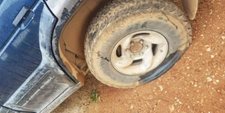
Israeli settlers, last night, punctured the tires of three Palestinian-owned vehicles and spray-painted racist graffiti on walls after raiding the village of al-Mughayyer, to the north of Ramallah, in the occupied West Bank.
Local witnesses told WAFA that settlers from the illegal Israeli settlement of Adei-Ad punctured the tires of three vehicles and sprayed anti-Arab and other racist slogans on other vehicles and on walls.
This attack is the third in three years, and the village mosque was set on fire twice, in 2011 and 2014
Local witnesses told WAFA that settlers from the illegal Israeli settlement of Adei-Ad punctured the tires of three vehicles and sprayed anti-Arab and other racist slogans on other vehicles and on walls.
This attack is the third in three years, and the village mosque was set on fire twice, in 2011 and 2014
25 nov 2018
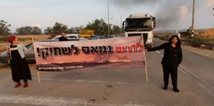
On Sunday morning, dozens of Israeli settlers from the Gaza enclave settlements rallied to block the roads leading to the Karm Abu Salem crossing, to prevent the arrival of trucks to the Gaza Strip.
According to the PNN, Kan Hebrew website reported that about 100 settlers living in the Gaza Strip, this morning, carried out demonstrations on the road to the settlement of Eshkol, to protest what they called the “security situation in the south” and the continuation of Palestinian demonstrations on the border with the Gaza Strip.
Dozens of settlers reportedly closed the roads leading to the Kerem Shalom crossing and intercepted goods trucks on their way to the Gaza Strip, demanding the Israeli government to achieve calm in the south.
The website said that the majority of participants, in these demonstrations, are students of secondary schools in the Gaza envelope settlements.
According to the PNN, Kan Hebrew website reported that about 100 settlers living in the Gaza Strip, this morning, carried out demonstrations on the road to the settlement of Eshkol, to protest what they called the “security situation in the south” and the continuation of Palestinian demonstrations on the border with the Gaza Strip.
Dozens of settlers reportedly closed the roads leading to the Kerem Shalom crossing and intercepted goods trucks on their way to the Gaza Strip, demanding the Israeli government to achieve calm in the south.
The website said that the majority of participants, in these demonstrations, are students of secondary schools in the Gaza envelope settlements.
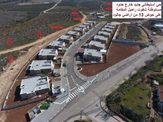
The Israeli occupation authorities are ongoing with the destruction and bulldozing of private Palestinian lands in Ein Jaloud village, south of the northern West Bank city of Nablus, as part of growing construction of an illegal colony.
Ghassan Daghlas, a Palestinian Authority official who monitors Israel’s illegal colonialist activities in northern West Bank, told WAFA Palestinian News Agency that the army is ongoing with preparation work, including a new road, a concrete water reservoir and new units on Palestinian lands on the hilltops of Jaloud.
He added that the colonialist settlers have already installed a large tent, and several wooden rooms in that area.
Daghlas also stated that the army, and the colonists, are ongoing with preparation work to expand the illegal colonies in five areas in Nablus, especially the expansion of Shvut Rachel and Amichai colonies.
“This is happening while Israel is ongoing with expansion work in Ahiya, Esh Kadesh and Kida illegal colonies, on Palestinian lands,” he added, “The constructions are even taking place on build more ‘neighborhoods’ outside of these colonies, by stealing more lands from the Palestinians.”
He also said that the colonies and outposts which were illegally built on the southern and eastern areas of Jaloud, have been witnessing a serious and dangerous escalation of illegal colonialist constructions, as Israel plans to create a colonialist bloc in an area of more than eight square/kilometers of lands owned by Jaloud villagers, in Area C of the occupied West Bank.
All of Israel’s colonies and outposts in the West Bank, including in and around occupied East Jerusalem, are illegal under International Law, the Fourth Geneva Convention, to which Israel is a signatory and a constant violator, in addition to various international treaties and agreements.
Ghassan Daghlas, a Palestinian Authority official who monitors Israel’s illegal colonialist activities in northern West Bank, told WAFA Palestinian News Agency that the army is ongoing with preparation work, including a new road, a concrete water reservoir and new units on Palestinian lands on the hilltops of Jaloud.
He added that the colonialist settlers have already installed a large tent, and several wooden rooms in that area.
Daghlas also stated that the army, and the colonists, are ongoing with preparation work to expand the illegal colonies in five areas in Nablus, especially the expansion of Shvut Rachel and Amichai colonies.
“This is happening while Israel is ongoing with expansion work in Ahiya, Esh Kadesh and Kida illegal colonies, on Palestinian lands,” he added, “The constructions are even taking place on build more ‘neighborhoods’ outside of these colonies, by stealing more lands from the Palestinians.”
He also said that the colonies and outposts which were illegally built on the southern and eastern areas of Jaloud, have been witnessing a serious and dangerous escalation of illegal colonialist constructions, as Israel plans to create a colonialist bloc in an area of more than eight square/kilometers of lands owned by Jaloud villagers, in Area C of the occupied West Bank.
All of Israel’s colonies and outposts in the West Bank, including in and around occupied East Jerusalem, are illegal under International Law, the Fourth Geneva Convention, to which Israel is a signatory and a constant violator, in addition to various international treaties and agreements.
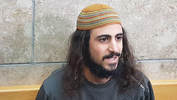
Yinon Reuveni, who is serving 5.5-year prison sentence for setting fire to the Church of Loaves and Fishes in 2015, expresses remorse for his actions in an effort to ease his conditions; 'I understand the many mistakes I made along the way,' he writes.
Yinon Reuveni, who is serving a 5.5-year sentence in prison for setting fire to the Church of Loaves and Fishes in 2015, has made an unusual confession and expressed remorse for his crime in an effort to ease his conditions.
The Jewish settler was initially sentenced to four years in prison. He appealed the ruling to the High Court of Justice, which decided to increase his sentence to five-and-a-half years.
Reuveni wrote a letter two months ago, which has only just come to light, expressing remorse. "The years that have passed gave me a lot of time to think, and today I'm in a different place," Reuveni wrote.
"I understand the many mistakes I made along the way, I understand I was with the wrong company, I understand I was pushing the boundaries of the gray area, including by breaking administrative orders," he continued. "Today I see things differently than when I was a teenager, I know reality is more complex and life is not black and white. I caused suffering to my parents, my family, and those around me, and mostly I did a disservice to myself."
A year ago, Reuveni got married in prison at a small wedding that included only first-degree relatives. Since then, he has been asking the Israel Prison Service (IPS) to ease his strict imprisonment conditions so he could have a relationship with his wife.
"There are a lot of examples of Hilltop Youth who were in one place and, after having started a family, are now in a different place," Reuveni wrote, referring to extremist right-wing settler youth who live in illegal outposts. "They became productive members of society, and that is exactly what I want to be. I love the state and the people. I got here because I didn't think enough. Today I still love this country and want to be loyal to the homeland and follow the laws of the State of Israel."
Reuveni was also questioned in connection with the Duma arson affair and the murder of the Dawabsheh family, and on suspicions of additional Jewish terror offenses. He was one of the top targets of the Shin Bet's Jewish Division.
Reuveni was, until recently, both a prisoner and a detainee. His legal status changed after the district court ordered to release him from detainment as part of a price tag case against him, and now he remains only a prisoner. Reuveni and his family hope the change in legal status would mean a change in his conditions.
"Now his legal status is similar to that of many other Jewish security prisoners who are imprisoned in religious wings and are allowed phone calls and visits from their families," one of Reuveni's relatives explained. "There's no reason Yinon can't have the same conditions. We hope the cruelty towards him ends. He got married, he wants to start a new life, to be rehabilitated and start a family. There's no reason why he shouldn't be allowed that."
The Church of Loaves and Fishes, which is run by the Order of Saint Benedict, is considered one of the most important churches in Israel. Christians believe the church is built on the site where Jesus performed the Miracle of the Multiplication of the Loaves and the Fishes. It is a traditional site of pilgrimage in the Holy Land.
In June 2015, Reuveni and several others torched the church, causing extensive damage to two rooms and the structure's exterior. Reuveni also defaced the limestone wall with red paint denouncing the worship of idols.
Yinon Reuveni, who is serving a 5.5-year sentence in prison for setting fire to the Church of Loaves and Fishes in 2015, has made an unusual confession and expressed remorse for his crime in an effort to ease his conditions.
The Jewish settler was initially sentenced to four years in prison. He appealed the ruling to the High Court of Justice, which decided to increase his sentence to five-and-a-half years.
Reuveni wrote a letter two months ago, which has only just come to light, expressing remorse. "The years that have passed gave me a lot of time to think, and today I'm in a different place," Reuveni wrote.
"I understand the many mistakes I made along the way, I understand I was with the wrong company, I understand I was pushing the boundaries of the gray area, including by breaking administrative orders," he continued. "Today I see things differently than when I was a teenager, I know reality is more complex and life is not black and white. I caused suffering to my parents, my family, and those around me, and mostly I did a disservice to myself."
A year ago, Reuveni got married in prison at a small wedding that included only first-degree relatives. Since then, he has been asking the Israel Prison Service (IPS) to ease his strict imprisonment conditions so he could have a relationship with his wife.
"There are a lot of examples of Hilltop Youth who were in one place and, after having started a family, are now in a different place," Reuveni wrote, referring to extremist right-wing settler youth who live in illegal outposts. "They became productive members of society, and that is exactly what I want to be. I love the state and the people. I got here because I didn't think enough. Today I still love this country and want to be loyal to the homeland and follow the laws of the State of Israel."
Reuveni was also questioned in connection with the Duma arson affair and the murder of the Dawabsheh family, and on suspicions of additional Jewish terror offenses. He was one of the top targets of the Shin Bet's Jewish Division.
Reuveni was, until recently, both a prisoner and a detainee. His legal status changed after the district court ordered to release him from detainment as part of a price tag case against him, and now he remains only a prisoner. Reuveni and his family hope the change in legal status would mean a change in his conditions.
"Now his legal status is similar to that of many other Jewish security prisoners who are imprisoned in religious wings and are allowed phone calls and visits from their families," one of Reuveni's relatives explained. "There's no reason Yinon can't have the same conditions. We hope the cruelty towards him ends. He got married, he wants to start a new life, to be rehabilitated and start a family. There's no reason why he shouldn't be allowed that."
The Church of Loaves and Fishes, which is run by the Order of Saint Benedict, is considered one of the most important churches in Israel. Christians believe the church is built on the site where Jesus performed the Miracle of the Multiplication of the Loaves and the Fishes. It is a traditional site of pilgrimage in the Holy Land.
In June 2015, Reuveni and several others torched the church, causing extensive damage to two rooms and the structure's exterior. Reuveni also defaced the limestone wall with red paint denouncing the worship of idols.

Sheikh Ekrima Sabri, head of the Higher Islamic Council in Jerusalem, on Sunday warned of suspicious loans offered by Israeli companies with the aim of seizing Palestinian property in Jerusalem.
Sabri said in a statement that many Israeli companies have recently launched social media advertisements offering loans to the Palestinians living in Jerusalem and encouraging them to mortgage their homes, real estate, or lands in exchange for hundreds of thousands of dollars.
He warned of these suspicious loans and stressed that they are aimed at seizing Palestinian property in Jerusalem and selling it to Israeli settlers.
He called on the Jerusalemite people to be careful and not to deal with those Israeli companies or sign documents they are not aware of their content.
Sheikh Sabri explained that such suspicious loans will eventually lead to the accumulation of debt and loss of property.
Sabri said in a statement that many Israeli companies have recently launched social media advertisements offering loans to the Palestinians living in Jerusalem and encouraging them to mortgage their homes, real estate, or lands in exchange for hundreds of thousands of dollars.
He warned of these suspicious loans and stressed that they are aimed at seizing Palestinian property in Jerusalem and selling it to Israeli settlers.
He called on the Jerusalemite people to be careful and not to deal with those Israeli companies or sign documents they are not aware of their content.
Sheikh Sabri explained that such suspicious loans will eventually lead to the accumulation of debt and loss of property.

After Israel’s settlement expansion has devoured the bulk of Qaryut town in southern Nablus, especially in Area C of the occupied West Bank, settlers’ eyes are now directed at Area B in order to steal the remaining tracts of land from this settlement-afflicted town.
What has exposed Israel’s settlement expansionism in Area B is the attempt of the municipal council of Qaryut to build an agricultural road leading to the Palestinian area of Batisha in the west of the town and near the illegal settlement of Eli.
Just immediately after the town’s municipal council embarked on carrying out the road project, dozens of Jewish settlers attacked Palestinian workmen and physically assaulted them, and later Israeli soldiers intervened and forced the workers to stop building the road and leave the area with their equipment.
Less than a week later, the road workers returned to the area to resume their work, but Israeli forces stormed the site and forced them again to leave at gunpoint.
The area of Batisha in Qaryut contains vast tracts of land that are planted with olive trees, and it is considered the only remaining agricultural area which Qaryut residents can reach almost freely because it is located in Area B, which is under the Palestinian civil jurisdiction according to the classifications stipulated by Oslo Accords.
Qaryut is located about 26 kilometers to the south of Nablus and its total area is approximately 20,000 dunums of land, of which 14,000 dunums are located within Area C according to Oslo Accords. However, the residents of Qaryut are allowed to build only on 360 dunums of land.
It is one of the Palestinian towns and villages that are systematically targeted by the Israeli occupation state and Jewish settlers. Thousands of dunums of its land have been seized to build and expand illegal settlements.
Israeli settlements encircle Qaryut from all sides and they keep encroaching into further territory, eliminating any possibility for the native population to expand their residential and agricultural areas.
The settlements built on grabbed land in the town are Eli, established in 1984, and Shvut Rachel, 1995, and Shiloh, 1979. There are also the outposts of Hioval, Givat Ariel, Kida, and Adei Ad.
These settlements and outposts devoured 65 percent of the total area of Qaryut (about 14,000 dunums of land).
Such systematic settlement expansion and activity in Qaryut and its nearby areas are aimed at forcing the native population to migrate in order to connect the three settlements in the town with each other and make them one huge settlement bloc extending from Ariel settlement to the Jordan Valley in the east.
What has exposed Israel’s settlement expansionism in Area B is the attempt of the municipal council of Qaryut to build an agricultural road leading to the Palestinian area of Batisha in the west of the town and near the illegal settlement of Eli.
Just immediately after the town’s municipal council embarked on carrying out the road project, dozens of Jewish settlers attacked Palestinian workmen and physically assaulted them, and later Israeli soldiers intervened and forced the workers to stop building the road and leave the area with their equipment.
Less than a week later, the road workers returned to the area to resume their work, but Israeli forces stormed the site and forced them again to leave at gunpoint.
The area of Batisha in Qaryut contains vast tracts of land that are planted with olive trees, and it is considered the only remaining agricultural area which Qaryut residents can reach almost freely because it is located in Area B, which is under the Palestinian civil jurisdiction according to the classifications stipulated by Oslo Accords.
Qaryut is located about 26 kilometers to the south of Nablus and its total area is approximately 20,000 dunums of land, of which 14,000 dunums are located within Area C according to Oslo Accords. However, the residents of Qaryut are allowed to build only on 360 dunums of land.
It is one of the Palestinian towns and villages that are systematically targeted by the Israeli occupation state and Jewish settlers. Thousands of dunums of its land have been seized to build and expand illegal settlements.
Israeli settlements encircle Qaryut from all sides and they keep encroaching into further territory, eliminating any possibility for the native population to expand their residential and agricultural areas.
The settlements built on grabbed land in the town are Eli, established in 1984, and Shvut Rachel, 1995, and Shiloh, 1979. There are also the outposts of Hioval, Givat Ariel, Kida, and Adei Ad.
These settlements and outposts devoured 65 percent of the total area of Qaryut (about 14,000 dunums of land).
Such systematic settlement expansion and activity in Qaryut and its nearby areas are aimed at forcing the native population to migrate in order to connect the three settlements in the town with each other and make them one huge settlement bloc extending from Ariel settlement to the Jordan Valley in the east.

Dozens of Israeli settlers on Sunday morning forced their way into al-Aqsa Mosque amid heavy police presence.
Quds Press reported that 43 Israeli settlers stormed al-Aqsa Mosque during the morning hours and performed Talmudic rituals at al-Rahma Gate.
It added that Israeli police forces accompanied the settlers until they left the site through al-Silsila Gate.
Israeli settlers' break-ins into al-Aqsa Mosque are witnessed on a daily basis, except on Saturdays and Fridays. The break-ins are usually carried out in two rounds: in the morning and the afternoon.
Quds Press reported that 43 Israeli settlers stormed al-Aqsa Mosque during the morning hours and performed Talmudic rituals at al-Rahma Gate.
It added that Israeli police forces accompanied the settlers until they left the site through al-Silsila Gate.
Israeli settlers' break-ins into al-Aqsa Mosque are witnessed on a daily basis, except on Saturdays and Fridays. The break-ins are usually carried out in two rounds: in the morning and the afternoon.

Dozens of Israeli young men, students and workers, who live in settlements near the Gaza border participated in a sit-in on Sunday morning to demand the Israeli government to preserve permanent calm on the Gaza front.
According to the Hebrew newspaper Yedioth Ahronoth, the sit-in was staged at the entrance to Eshkol regional council.
The demonstrators were protesting the volatile security situation on the Israeli-Gaza border and chanted slogans calling on the government to let them live peacefully and quietly.
Gaza has been under inhumane blockade for about 12 years, while Israel commits, every once in a while, systematic crimes against the population.
15 nov 2018 Poll: 64% of Israelis seek to escalate aggressions on Gaza
According to the Hebrew newspaper Yedioth Ahronoth, the sit-in was staged at the entrance to Eshkol regional council.
The demonstrators were protesting the volatile security situation on the Israeli-Gaza border and chanted slogans calling on the government to let them live peacefully and quietly.
Gaza has been under inhumane blockade for about 12 years, while Israel commits, every once in a while, systematic crimes against the population.
15 nov 2018 Poll: 64% of Israelis seek to escalate aggressions on Gaza
24 nov 2018
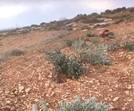
A group of illegal Israeli colonialist settlers invaded, Saturday, a Palestinian olive orchard in the Seder area, in Turmus Ayya village, northeast of the central West Bank city of Ramallah, and uprooted dozens of olive trees.
The colonists invaded the Palestinian orchard and cut the trees although the land is just a few meters away from an Israeli military observation post overlooking it and the surrounding areas, media sources said.
They added that the farmers filed a complaint with the Israeli army and police, and that the soldiers were already in the invaded lands when the Palestinian owners arrived and saw the damage.
Such attacks and violations against the Palestinian lands have been seriously escalating, while the military fails to apprehend or conduct a serious investigation into the ongoing assaults.
The violations carried out by the illegal colonialist setters include cutting, uprooting and burning trees, flooding orchards and farmlands with wastewater, in addition to attacks against the Palestinians, their homes and cars, in addition to racist graffiti and the defacing of graveyards and holy sites, including, burning or attempting to burn mosque and churches.
The colonists invaded the Palestinian orchard and cut the trees although the land is just a few meters away from an Israeli military observation post overlooking it and the surrounding areas, media sources said.
They added that the farmers filed a complaint with the Israeli army and police, and that the soldiers were already in the invaded lands when the Palestinian owners arrived and saw the damage.
Such attacks and violations against the Palestinian lands have been seriously escalating, while the military fails to apprehend or conduct a serious investigation into the ongoing assaults.
The violations carried out by the illegal colonialist setters include cutting, uprooting and burning trees, flooding orchards and farmlands with wastewater, in addition to attacks against the Palestinians, their homes and cars, in addition to racist graffiti and the defacing of graveyards and holy sites, including, burning or attempting to burn mosque and churches.
